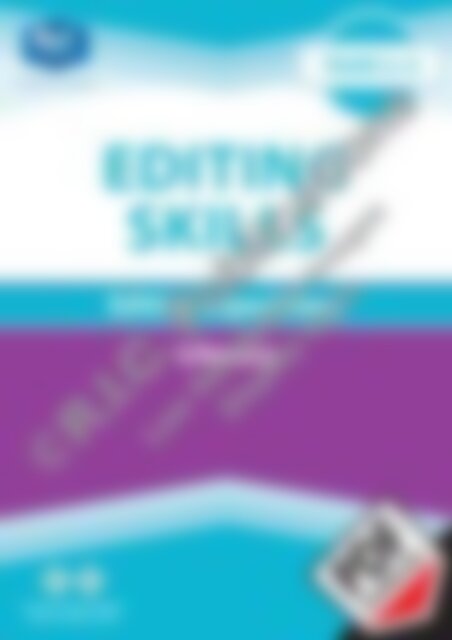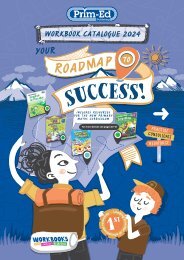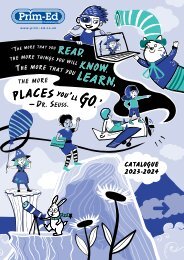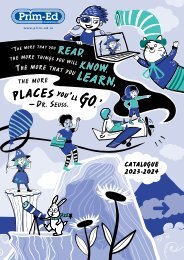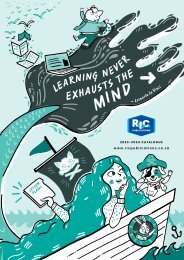20857_Editing_expositions_Years_4_and_5
Create successful ePaper yourself
Turn your PDF publications into a flip-book with our unique Google optimized e-Paper software.
Your partner in education<br />
YEARS 4–5<br />
EDITING<br />
SKILLS<br />
<strong>Editing</strong> <strong>expositions</strong><br />
Literacy<br />
Australian Primary Publisher<br />
of the Year 2015 <strong>and</strong> 2016
EDITING SKILLS (Ages 10–11)<br />
Published by R.I.C. Publications ® 2005<br />
Copyright © R.I.C. Publications ® 2005<br />
RIC–<strong>20857</strong><br />
This master may only be reproduced by the<br />
original purchaser for use with their class(es). The<br />
publisher prohibits the loaning or onselling of this<br />
master for the purposes of reproduction.<br />
Copyright Notice<br />
Blackline masters or copy masters are published <strong>and</strong><br />
sold with a limited copyright. This copyright allows<br />
publishers to provide teachers <strong>and</strong> schools with a<br />
wide range of learning activities without copyright<br />
being breached. This limited copyright allows the<br />
purchaser to make sufficient copies for use within<br />
their own education institution. The copyright is not<br />
transferable, nor can it be onsold. Following these<br />
instructions is not essential but will ensure that you,<br />
as the purchaser, have evidence of legal ownership<br />
to the copyright if inspection occurs.<br />
For your added protection in the case of copyright<br />
inspection, please complete the form below. Retain<br />
this form, the complete original document <strong>and</strong> the<br />
invoice or receipt as proof of purchase.<br />
Name of Purchaser:<br />
Date of Purchase:<br />
Supplier:<br />
School Order# (if applicable):<br />
Signature of Purchaser:<br />
Internet websites<br />
In some cases, websites or specific URLs may be recommended. While these are checked <strong>and</strong> rechecked at the<br />
time of publication, the publisher has no control over any subsequent changes which may be made to webpages.<br />
It is strongly recommended that the class teacher checks all URLs before allowing students to access them.<br />
View all pages online<br />
http://www.ricgroup.com.au
Foreword<br />
<strong>Editing</strong> skills consists of a selection of texts written in specific formats to provide punctuation,<br />
spelling <strong>and</strong> grammatical practice. Detailed descriptions of concepts, such as specific<br />
parts of speech <strong>and</strong> punctuation, are also included, as well as vocabulary enrichment <strong>and</strong><br />
aspects of writing.<br />
The aim is to provide students with varied, structured experiences in proofreading <strong>and</strong><br />
editing written texts. A high level of proficiency in these skills is vital for accurate selfmonitoring<br />
of written work.<br />
Other titles in this series are:<br />
• <strong>Editing</strong> skills 6–7<br />
• <strong>Editing</strong> skills 8–9<br />
• <strong>Editing</strong> skills 11+<br />
Contents<br />
Teachers information<br />
Teacher information................................................................................................................... iv – v<br />
Curriculum links................................................................................................................................ v<br />
Overview of activity content.......................................................................................................vi–vii<br />
Punctuation, spelling <strong>and</strong> grammar information......................................................................viii–xi<br />
Writing format information......................................................................................................xii– xiii<br />
Writing format checklists ...................................................................................................... xiv – xx<br />
Student proofreading <strong>and</strong> editing checklist.................................................................................. xxi<br />
Worksheets<br />
Tasmanian devil......................................... 2–3<br />
Dream catcher........................................... 4–5<br />
Robotic pets.............................................. 6–7<br />
Mars........................................................... 8–9<br />
Crown Princess Mary of Denmark.........10–11<br />
Why do stars twinkle?............................12–13<br />
Chinatown..............................................14–15<br />
Windswept poem...................................16–17<br />
Guard the treasure!............................... 18–19<br />
Eyewitness account.............................. 20–21<br />
The Aquada........................................... 22–23<br />
Cubbyhouse.......................................... 24–25<br />
Birthday parties..................................... 26–27<br />
Be healthy! Be happy!.......................... 28–29<br />
The ballad of Ned Kelly......................... 30–31<br />
Art thief arrest....................................... 32–33<br />
The ‘Titanic’ should be left alone......... 34–35<br />
The marine turtle................................... 36–37<br />
Matthew’s story.................................... 38–39<br />
The Great Barrier Reef.......................... 40–41<br />
Hermes.................................................. 42–43<br />
School vending machine..................... 44–45<br />
Annie the witch..................................... 46–47<br />
School concert........................................ 48–49<br />
Glow-worm grotto................................ 50–51<br />
How does a microwave oven work?... 52–53<br />
Roald Dahl............................................ 54–55<br />
How chewing gum is made................. 56–57<br />
Flying carpet......................................... 58–59<br />
Letter to the editor................................ 60–61<br />
Book review.......................................... 62–63<br />
Aquatic biomes.................................... 64–65<br />
Treating a nosebleed............................ 66–67<br />
How does velcro work?....................... 68–69<br />
Trees cross railway line........................ 70–71<br />
Said the teacup to the saucer.............. 72–73<br />
The frilled lizard.................................... 74–75<br />
Missing person..................................... 76–77<br />
Plant more trees!................................... 78–79<br />
Treasure hunt........................................ 80–81<br />
The Wallace Walking Club..................... 82–83<br />
Improve your freestyle swimming<br />
stroke............................................... 84–85<br />
R.I.C. Publications ® www.ricgroup.com.au <strong>Editing</strong> skills iii
Teacher information<br />
The following is an explanation of how to use the pages in this book.<br />
Teachers pages<br />
A teachers page accompanies each student worksheet. It provides the following information:<br />
Annie the witch<br />
Teachers notes<br />
Lesson focus<br />
Punctuation<br />
Grammar<br />
• Quotation marks for direct speech<br />
• Verb tense – past, present, future<br />
• Exclamation marks<br />
• Hyphens<br />
• Apostrophes in grammatical contractions<br />
• Capital letters for proper nouns<br />
Spelling<br />
• Misspelt words<br />
Teacher information<br />
A narrative tells about a series of events, usually involving fictitious characters.<br />
Answers<br />
‘You’re crazy, Mike! Old Annie’s a witch—everyone knows that!’<br />
‘Rubbish, Ian! My mum <strong>and</strong> dad say she’s just a lonely old lady.’<br />
‘I’m telling you she’s a witch!’<br />
Ian shook his head, his eyes behind the thick lenses opened<br />
wide <strong>and</strong> round. He dropped his voice to a whisper.<br />
‘And she killed her husb<strong>and</strong>—she served him poisoned cookies <strong>and</strong> milk. Homemade<br />
choc-chip cookies. And you want to go there by yourself—you’re a nutcase!’<br />
But nothing could shake Mike.<br />
‘I’m going to weed her garden for her—<strong>and</strong> she’s going to pay me ten dollars. And<br />
when I have that ten dollars, I’ll have saved enough for a new engine for my model<br />
aeroplane. And if you’re very lucky, I might let you play with it sometimes.’<br />
‘Yeah, if you’re alive, you mean …’<br />
1. Missing punctuation is in bold type.<br />
(d) Teacher check<br />
(f) you are, Annie is, she is, I am, I will<br />
2. (a) Spelling errors are in italic type.<br />
lonely, whisper, poisoned, enough<br />
3. (a) (i) knows – present (ii) shook – past (iii) dropped – past<br />
(iv) am going to weed – future<br />
46 <strong>Editing</strong> skills R.I.C. Publications ® www.ricgroup.com.au<br />
The lesson focus indicates the focus for each<br />
student page. This will include aspects from<br />
the areas of punctuation, spelling, grammar,<br />
vocabulary <strong>and</strong> writing. Some of these may involve<br />
simple recognition of a concept, or use an alreadyknown<br />
aspect. More detailed teacher information<br />
about punctuation, spelling <strong>and</strong> grammar can be<br />
found on pages viii–xi.<br />
Teacher information gives brief background<br />
information about each text type. More detailed<br />
information can be found on pages xii– xiii.<br />
Answers to all worksheet activities are provided.<br />
The corrected text is given with punctuation errors<br />
in bold. Correct spelling is highlighted in italics, as<br />
well as being provided in the answers section.<br />
Proofreading <strong>and</strong> editing<br />
marks<br />
Editors use a number of consistent<br />
symbols to indicate where changes<br />
are to be made in a text.<br />
Teachers may require students to use<br />
these ‘professional’ proofreading <strong>and</strong><br />
editing marks to indicate errors in the<br />
text on the student pages.<br />
NOTE:<br />
All spelling is taken from the<br />
Macquarie Dictionary, Revised<br />
Third Edition, while all punctuation<br />
is according to the Style manual<br />
for authors, editors <strong>and</strong> printers,<br />
Sixth edition, Revised by Snooks &<br />
Co. These are st<strong>and</strong>ard references<br />
for contemporary professional<br />
publishing.<br />
= insert (something)<br />
The weather hot<br />
The boys hat<br />
He went swiming.<br />
= delete (something)<br />
I went to to the shops.<br />
The dog broke it’s collar.<br />
+ lc = lower case<br />
a<br />
lc<br />
I don’t like Maths.<br />
+ cap. = capital letter<br />
+ correction = spelling<br />
‘<br />
was<br />
m<br />
cap.<br />
‘I’m telling mum.’<br />
He wos playing football.<br />
iv <strong>Editing</strong> skills R.I.C. Publications ® www.ricgroup.com.au
Student pages<br />
Teacher information<br />
• A specific text type is identified <strong>and</strong> presented for the students to read. The text has<br />
punctuation, spelling <strong>and</strong> grammatical errors for the student to identify.<br />
There are also opportunities presented for the students to work in the areas of grammar,<br />
vocabulary <strong>and</strong> writing as specified by the worksheet or teacher.<br />
• The texts are presented in two ways. One allows students to become familiar with<br />
formats they may encounter in some st<strong>and</strong>ardised tests; both follow a similar format for<br />
identifying <strong>and</strong> correcting proofreading <strong>and</strong> editing errors.<br />
The student activities follow a common format.<br />
Format 1<br />
The title of the text is given.<br />
Annie the witch<br />
<strong>Editing</strong> skills<br />
Read this narrative.<br />
Youre crazy, mike Old annies a witch—everyone knows that<br />
Rubbish, ian My mum <strong>and</strong> dad say shes just a lonley old lady.<br />
Im telling you shes a witch<br />
ian shook his head, his eyes behind the thick lenses opened<br />
wide <strong>and</strong> round. He dropped his voice to a wisper.<br />
And she killed her husb<strong>and</strong>—she served him poisned cookies <strong>and</strong> milk. Homemade<br />
choc-chip cookies. And you want to go there by yourself—youre a nutcase<br />
The specific text type is<br />
given <strong>and</strong> the text presented.<br />
Format 2<br />
But nothing could shake mike.<br />
Im going to weed her garden for her—<strong>and</strong> shes going to pay me ten dollars. And<br />
when I have that ten dollars, Ill have saved enugh for a new engine for my model<br />
aeroplane. And if youre very lucky, I might let you play with it sometimes.<br />
Yeah, if you’re alive, you mean …<br />
School vending machine<br />
Read the exposition.<br />
I think its a good idea that our school has decidded<br />
<strong>Editing</strong> skills<br />
1 Punctuation<br />
Speech marks are put at the beginning <strong>and</strong><br />
end of what has been spoken.<br />
(a) There are 6 separate speeches in the<br />
text. Add the missing speech marks.<br />
(f) Write the 5 different contractions used in<br />
the text in full below.<br />
to (by, buy, bye) a food vending machine for the<br />
student to use it will raise money for the school<br />
(which, witch) will directly benefit the students.<br />
also there isn’t no canteen or tucshop at the school<br />
(b) Write in 4 missing exclamation marks<br />
where the sentence suggests strong<br />
feelings.<br />
2 Spelling<br />
(c) Find 5 capital letters needed for proper (a) Underline 4 spelling mistakes in the text<br />
nouns.<br />
<strong>and</strong> write them correctly below.<br />
A hyphen (-) is used in some compound<br />
words to connect smaller words; for example,<br />
choc-chip.<br />
(d) Use a dictionary to find three other words 3 Grammar<br />
associated with food that also use a<br />
hyphen.<br />
(a) Indicate the tense of these verbs from<br />
the text by writing ‘past’, ‘future’ or<br />
‘present’ after each.<br />
(i) knows<br />
Apostrophes are used in grammatical contractions. (ii) shook<br />
They show that letters have been left out.<br />
(iii) dropped<br />
(e) In the text, add the missing apostrophes<br />
in 11 contractions.<br />
(iv) am going to weed<br />
R.I.C. Publications ® www.ricgroup.com.au <strong>Editing</strong> skills 47<br />
Headings indicate which punctuation,<br />
spelling, grammatical, vocabulary <strong>and</strong><br />
writing mistakes need to be identified <strong>and</strong><br />
corrected by the student. Extra practice is<br />
given in particular areas.<br />
(sew, so) students cant buy food from anywhere else<br />
this means that parents must prepare s<strong>and</strong>wich<br />
or other food for (there, their) children every day.<br />
In addition the school board has promissed that the<br />
vending machine will contain only hellthy food.<br />
Therefore i cant underst<strong>and</strong> why (some, sum)<br />
parent dont want the vending machine I<br />
hop it arrives soon.<br />
You can add ‘s’ or ‘es’ to most singular<br />
1 Punctuation<br />
nouns to make them plurals.<br />
(a) Write the missing<br />
(c) There are 3 singular nouns in the<br />
capital letters, full<br />
text which need ‘s’ or ‘es’ added<br />
stops, 3 commas<br />
to them to make them plurals.<br />
<strong>and</strong> 2 apostrophes.<br />
Circle each <strong>and</strong> write its correct<br />
plural form in the space at the<br />
2 Grammar<br />
end of the line.<br />
Conjunctions can join<br />
single words or groups<br />
of words.<br />
(a) Write the words joined by the conjunction<br />
‘or’ in the text.<br />
4 Writing<br />
A double negative statement incorrectly uses<br />
two negative words; for example, ‘I haven’t<br />
3 got no more,’ should be ‘I haven’t any more’<br />
Spelling<br />
or ‘I have no more’.<br />
(a) Choose the correct spelling from each<br />
(a) Underline the words in the text containing<br />
pair of words in brackets. Write your<br />
a double negative. Write them correctly.<br />
choice in the space at the end of the line.<br />
(b) Write the correct spelling for the misspelt<br />
words in the space at the end of the line.<br />
R.I.C. Publications ® www.ricgroup.com.au <strong>Editing</strong> skills 45<br />
Student instructions are written in a consistent format to encourage students to concentrate<br />
on the activity.<br />
Where an instruction requires students to ‘find capital letters etc.’, teachers should select<br />
their own method for students to use; for example, circle, highlight with a coloured marker,<br />
underline or write over the error. Some proofreading <strong>and</strong> editing marks may be used. (See<br />
teachers notes page iv.)<br />
Curriculum links<br />
Year 4<br />
Re-read <strong>and</strong> edit for meaning by adding, deleting or<br />
moving words or word groups to improve content<br />
<strong>and</strong> structure (ACELY1695)<br />
Year 5<br />
Re-read <strong>and</strong> edit student’s own <strong>and</strong> others’ work<br />
using agreed criteria for text structures <strong>and</strong> language<br />
features (ACELY1705)<br />
R.I.C. Publications ® www.ricgroup.com.au <strong>Editing</strong> skills v
Activity content overview<br />
Activity content Page number<br />
PUNCTUATION 3 5 7 9 11 13 15 17 19 21 23 25 27 29 31 33 35 37 39 41 43 45 47 49 51 53 55 57 59 61 63 65 67 69 71 73 75 77 79 81 83 85<br />
Full stops<br />
• • • • • • • • • • • • • • • • • • • • • • • •<br />
Capital letters: begin. of sentences<br />
• • • • • • • • • • • • • • • • • • • • • • • • • •<br />
proper nouns<br />
• • • • • • • • • • • • • • • • • • • •<br />
in titles<br />
• • •<br />
Question marks<br />
• • • • • • •<br />
Exclamation marks<br />
• • • • • • •<br />
Commas: in a list<br />
• • • • • • • • • • •<br />
grammatical<br />
• • • • • • • • • • • • • • • • • • • • • • • • • • • •<br />
Apostrophes: contractions • • • • • • • • •<br />
possession<br />
• • • • • • • • • • • • • • •<br />
Quotation marks<br />
• • • • • • •<br />
Colons in titles<br />
• • • •<br />
offset lists<br />
• • • • • •<br />
Brackets<br />
• •<br />
Hyphens • • • • • • • • •<br />
SPELLING<br />
Misspelt words<br />
• • • • • • • • • • • • • • • • • • • • • • • • • • • • • • • • • • • • • • • • •<br />
Confused words<br />
• • • • • • • • • • • • • • • • • • • • • • • • • • • •<br />
Plurals: adding ‘s’ <strong>and</strong> ‘es’<br />
• • • • • • • •<br />
change ‘y’ to ‘i’<br />
•<br />
‘i’ before ‘e’ •<br />
TEXT TYPE<br />
D<br />
N<br />
Expo.<br />
Rep.<br />
Rec.<br />
Expl.<br />
D<br />
Poet.<br />
P<br />
Rec.<br />
D<br />
N<br />
Rep.<br />
Expo.<br />
Poet.<br />
Rec.<br />
Expo.<br />
Rep.<br />
Rec.<br />
D<br />
N<br />
Expo.<br />
N<br />
Rec.<br />
D<br />
Expl.<br />
Rec.<br />
Expl.<br />
N<br />
Expo.<br />
Rep.<br />
Expl.<br />
P<br />
Expl.<br />
Rec.<br />
N<br />
Rep.<br />
D<br />
Expo.<br />
P<br />
Rep.<br />
P<br />
vi <strong>Editing</strong> skills R.I.C. Publications ® www.ricgroup.com.au
Activity content Page number<br />
GRAMMAR 3 5 7 9 11 13 15 17 19 21 23 25 27 29 31 33 35 37 39 41 43 45 47 49 51 53 55 57 59 61 63 65 67 69 71 73 75 77 79 81 83 85<br />
Nouns: common nouns<br />
• • • •<br />
collective nouns<br />
•<br />
Pronouns<br />
• • • • • • •<br />
Adjectives<br />
• • • • • • • • • •<br />
Verbs<br />
• • •<br />
Verb tenses<br />
• • • • • • • • • •<br />
Subject-verb agreement<br />
• • • • • • • • • • • •<br />
Adverbs<br />
• • • • • • • • • • •<br />
Prepositions<br />
• • • • • •<br />
Conjunctions<br />
• • • • •<br />
Indefinite article: ‘a’ or ‘an’ • •<br />
VOCABULARY<br />
Enrichment<br />
• • • • • •<br />
Synonyms<br />
• • • •<br />
Antonyms<br />
• • • •<br />
Compound words<br />
• • • • • •<br />
Shortened forms • •<br />
WRITING<br />
Paragraphs<br />
• • •<br />
Double negatives • • • • • • •<br />
TEXT TYPE<br />
D<br />
N<br />
Expo.<br />
Rep.<br />
Rec.<br />
Expl.<br />
D<br />
Poet.<br />
P<br />
Rec.<br />
D<br />
N<br />
Rep.<br />
Expo.<br />
Poet.<br />
Rec.<br />
Expo.<br />
Rep.<br />
Rec.<br />
D<br />
N<br />
Expo<br />
N<br />
Rec<br />
D<br />
Expl.<br />
Rec.<br />
Expl.<br />
N<br />
Expo.<br />
Rep.<br />
Expl.<br />
P<br />
Expl.<br />
Rec.<br />
N<br />
Rep<br />
D<br />
Expo.<br />
P<br />
Rep.<br />
P<br />
Narrative – N Explanation – Expl. Procedure – P Recount – Rec. Report – Rep. Exposition – Expo. Description – D Poetry – Poet.<br />
R.I.C. Publications ® www.ricgroup.com.au <strong>Editing</strong> skills vii
Punctuation, spelling <strong>and</strong> grammar information<br />
PUNCTUATION<br />
Please note: In some cases, teachers will need to exercise their own judgment with regard to<br />
punctuation, as certain aspects, particularly commas <strong>and</strong> exclamation marks, are to an extent<br />
discretionary <strong>and</strong> depend on the individual writer’s intent.<br />
Capital letters<br />
Capital letters are needed for:<br />
• sentence beginnings; e.g. My dog is very friendly. He welcomes everyone.<br />
• proper nouns – people’s names (Chloe Parker), names of places (Indian Ocean), days of<br />
the week (Saturday), months (December), holidays <strong>and</strong> festivals (Christmas ), countries<br />
(America), nationalities (Russian), languages (Italian) <strong>and</strong> religions (Buddhism).<br />
• titles; e.g. World Health Organisation<br />
NOTE: R.I.C. Publications employs minimal capitalisation for titles of books <strong>and</strong> other<br />
publications as recommended by Style manual for authors, editors <strong>and</strong> printers,<br />
sixth edition 2002.<br />
Commas<br />
To kill a mockingbird<br />
Commas are used to separate items in a list or series.<br />
I enjoy reading, playing squash, skiing <strong>and</strong> swimming.<br />
Grammatical commas are used to:<br />
• make the meaning of a sentence clear.<br />
Jane said her mother is very busy.<br />
Jane, said her mother, is very busy.<br />
• indicate where a pause is needed in a sentence.<br />
Many years ago, dinosaurs roamed the Earth.<br />
Apostrophes for possession<br />
Snow White <strong>and</strong> the seven dwarfs<br />
(Jane’s mother is very busy.)<br />
(Jane is very busy.)<br />
Apostrophes are used to show that something belongs to someone or something.<br />
The placement of the apostrophe can be challenging but the simple rule is that it is placed<br />
after the owner or owners. (The ‘tail’ of the apostrophe ‘points’ to the owner(s).)<br />
the boy’s shoes (one boy) ............... the boys’ shoes (more than one boy)<br />
the lady’s hats (one lady)............... the ladies’ hats (more than one lady)<br />
Grammatical contractions<br />
Grammatical contractions are words that have been made by joining <strong>and</strong> shortening two<br />
words. An apostrophe is used in place of the missing letters.<br />
would not..............wouldn’t<br />
I would............................I’d<br />
Exclamation marks<br />
will not......................won’t<br />
they are.................. they’re<br />
Exclamation marks are used to end exclamations <strong>and</strong> imperatives (comm<strong>and</strong>s) <strong>and</strong> for<br />
emphasis at the end of a statement.<br />
I love it!<br />
Teacher information<br />
Don’t touch!<br />
She ate every bit of it!<br />
Note: If overused, exclamation marks lose their effect.<br />
viii <strong>Editing</strong> skills R.I.C. Publications ® www.ricgroup.com.au
Quotation marks<br />
Quotation marks are used:<br />
• to enclose quoted speech<br />
Single or double quotation marks are accepted but must be used consistently.<br />
‘You’re late again’, my mother complained.<br />
“I’m sorry”, I replied.<br />
• To enclose quotes within quotes, one set is used outside <strong>and</strong> the other inside.<br />
He reported, ‘My mother complained, “Late again, John”’.<br />
• To cite a title (Note: In word processing, italics is preferred.).<br />
Colons<br />
I read the book ‘Black Beauty’.<br />
A colon is a marker of relationship <strong>and</strong> sequence. Colons are used:<br />
• before offset lists<br />
You need to take:<br />
warm socks,<br />
sturdy walking shoes,<br />
a raincoat.<br />
• between a statement <strong>and</strong> explanation<br />
I remember you: we went to the same school.<br />
• with quotations<br />
Malcolm Fraser said: ‘Life wasn’t meant to be easy’.<br />
Parentheses (round brackets)<br />
The main use of parentheses is to enclose explanations <strong>and</strong> asides.<br />
Parentheses are used to:<br />
• add explanatory words<br />
Ian Thorpe (Australia) is a champion swimmer.<br />
• express the same thing in a different way<br />
He ran 6 km (kilometres).<br />
• set-off an aside<br />
Hyphens<br />
He won the race in record (yet to be confirmed) time.<br />
Hyphens are short strokes (without a space on either side) used to join words or parts of<br />
words.<br />
ice-cream<br />
Teacher information<br />
pre-existing<br />
Note: Students should be encouraged to refer to a modern dictionary to check for current<br />
hyphenation, as it changes over time in response to common use.<br />
R.I.C. Publications ® www.ricgroup.com.au <strong>Editing</strong> skills ix
Teacher information<br />
GRAMMAR<br />
Nouns<br />
Nouns are naming words of people, places <strong>and</strong> things; e.g. teacher, school, desk.<br />
Proper nouns name individual people (Bill), places (Kings Park) <strong>and</strong> others (Christmas,<br />
December, Sunday). Proper nouns are written with capital letters.<br />
Common nouns are any other nouns.<br />
Collective nouns are a subset of common nouns; e.g. a team of players.<br />
Pronouns<br />
A pronoun is a word substituted for a noun; e.g. They asked him to help them.<br />
Personal pronouns refer to you, me <strong>and</strong> other people; e.g. I, me, you, she, us, them.<br />
Adjectives<br />
Adjectives modify (enhance or change) the meaning of nouns <strong>and</strong>, less commonly,<br />
pronouns; e.g. parched l<strong>and</strong>; green, fertile l<strong>and</strong>; poor old me; lucky you.<br />
Verbs<br />
Verbs are ‘doing’ words; e.g. swim, like, look.<br />
Auxiliary verbs join other verbs to form verb groups; e.g. have eaten, will be asleep.<br />
Verb tense. There are three basic tenses. Because there are so many irregular verbs in<br />
English, tense can be complex.<br />
regular<br />
irregular<br />
Subject-verb agreement<br />
the past..................... the present.......................the future<br />
played...............................play................................will play<br />
has played.......................plays......................... should play<br />
went.................................. go................................... will go<br />
has gone.......................... goes............................should go<br />
NOTE: The future <strong>and</strong> the past tenses often use auxiliary verbs.<br />
Verbs have to agree with their subjects<br />
The children cheer loudly.<br />
(subject-plural) verb<br />
The child cheers loudly<br />
(subject-singular) verb<br />
Many English verbs are irregular, which can cause problems, particularly for students from<br />
non-English speaking backgrounds.<br />
He is at school.<br />
He was busy.<br />
They are at school.<br />
They were busy.<br />
In some sentences the subject of a verb is separated from the verb <strong>and</strong> not easy to locate.<br />
Students should be encouraged to ask themselves ‘who’ or ‘what’ before the verb.<br />
Adverbs<br />
‘The boy, although really late for school <strong>and</strong> likely to get into trouble, dawdled.<br />
‘dawdled’ is the verb.<br />
‘The boy’ is the subject. (‘Who dawdled?’)<br />
Adverbs are words that modify (enhance or change) the meaning of verbs.<br />
He ran quickly.<br />
There are adverbs of:<br />
I’ve seen this before.<br />
time........................e.g. yesterday<br />
place......................e.g. downstairs<br />
manner...................e.g. carefully<br />
x <strong>Editing</strong> skills R.I.C. Publications ® www.ricgroup.com.au
Prepositions<br />
Prepositions show the relationship between nouns <strong>and</strong>/or pronouns in the same sentence.<br />
Common prepositions include: across, about, between, by, during, for, from, in, of, since,<br />
through, until, without, up<br />
Conjunctions<br />
He disappeared during the night.<br />
I’m afraid of spiders.<br />
I enjoy reading books about travel.<br />
Conjunctions are joining words. They can join different language units.<br />
• One word with another .........................e.g. black or white<br />
• One phrase with another........................e.g. on the beach <strong>and</strong> in the s<strong>and</strong><br />
• One clause with another........................e.g. He asked me if I could cook.<br />
• One sentence with another....................e.g. I was hot so I went for a swim.<br />
SPELLING<br />
Singular <strong>and</strong> plural nouns<br />
Adding ‘s’ <strong>and</strong> ‘es’<br />
Teacher information<br />
The most commonly used plural is made by adding ‘s’; e.g. books, games.<br />
It is usually necessary to add ‘es’ to nouns ending in ‘ch’, ‘sh’, ‘s’, ‘x’ <strong>and</strong> ‘z’ to make the<br />
plural easier to pronounce; e.g. washes, dishes, classes, foxes <strong>and</strong> waltzes.<br />
Words ending in ‘o’ are also often made into a plural by adding ‘es’; potatoes, tomatoes.<br />
There are many exceptions, including radios, merinos, silos, zeros, photos <strong>and</strong> sopranos.<br />
Students should be encouraged to consult a dictionary if uncertain about the spelling of a<br />
plural.<br />
Changing ‘y’ to ‘i’ <strong>and</strong> adding ‘es’<br />
Many nouns <strong>and</strong> verbs ending with ‘y’, change the ‘y’ to ‘i’ before adding ‘es’.<br />
lady (singular noun)................................ ladies (plural noun)<br />
curry (singular noun).............................. curries (plural noun)<br />
I cry........................................................ he cries (verbs)<br />
‘i’ before ‘e’ except after ‘c’<br />
Like most rules, there are many exceptions, but this rule is generally true.<br />
perceive, thief, receive – seize, caffeine (exceptions)<br />
R.I.C. Publications ® www.ricgroup.com.au <strong>Editing</strong> skills xi
Teacher information<br />
Writing format information<br />
Exposition<br />
– is a framework which argues for<br />
a particular position <strong>and</strong> attempts<br />
to persuade the audience to share<br />
this view.<br />
– includes:<br />
• Introduction:<br />
statement of the problem <strong>and</strong><br />
the writer’s position<br />
• Arguments:<br />
presented in a logical manner<br />
with supporting detail, usually<br />
from the strongest to the<br />
weakest<br />
• Conclusion:<br />
– uses:<br />
an evaluation restating the<br />
writer’s position.<br />
• persuasive language<br />
• paragraphs to state <strong>and</strong><br />
elaborate on each point.<br />
An exposition may be written in<br />
the form of an essay, a letter, a<br />
policy statement, a critical review,<br />
an advertisement, an editorial or a<br />
speech.<br />
Explanation<br />
– is a framework which outlines how or why something<br />
occurs, works or is made.<br />
– includes:<br />
• Statement:<br />
precisely what is to be explained<br />
• Explanation:<br />
a clear account in logical sequence of how <strong>and</strong><br />
why the phenomenon occurs<br />
• Conclusion:<br />
OR<br />
an evaluation <strong>and</strong> comment about what has been<br />
explained.<br />
• a definition<br />
• a description of the components or parts<br />
• the operation—how it works or is made<br />
• the application—where <strong>and</strong> when it works or is<br />
applied<br />
• special features—interesting comments<br />
• evaluation or comment<br />
– uses:<br />
• subject–specific terms <strong>and</strong> technical vocabulary<br />
where appropriate<br />
• simple present tense<br />
• linking words to show cause <strong>and</strong> effect.<br />
An explanation may be written in the form of an essay, or<br />
a h<strong>and</strong>book—for example, how a kite works—a science<br />
text, a health text or a social studies text.<br />
Description<br />
– is a framework which describes the characteristics, components or function of specific living<br />
or non-living things.<br />
Physical characteristics of living things are described or the components of non-living things<br />
<strong>and</strong> their functions. Special features are also discussed. This type of writing can be used to<br />
describe, for example, a specific breed of animal, object or picture.<br />
– includes:<br />
• Introduction: what it is<br />
• Description: its appearance: colour, shape, size etc.<br />
• Interesting details/special features<br />
• Concluding statement.<br />
– uses:<br />
• adjectives extensively<br />
• conjunctions.<br />
A description may be written in poetic form <strong>and</strong> may describe a person, place, animal, thing<br />
or emotion.<br />
R.I.C. Publications ® www.ricgroup.com.au <strong>Editing</strong> skills xiii
Writing format checklists<br />
Student exposition checklist<br />
Title:<br />
Overview:<br />
The opening statement presents the topic <strong>and</strong><br />
what I think about it.<br />
Arguments:<br />
Arguments are presented in a logical manner.<br />
Supporting information is provided.<br />
The strongest arguments are presented first.<br />
Opposing arguments are rebutted.<br />
The language is persuasive.<br />
Conclusion:<br />
A summary of the supporting arguments is given.<br />
A evaluative conclusion is presented.<br />
Writing skills:<br />
• Paragraphs state <strong>and</strong> elaborate each point.<br />
• The writing style is impersonal.<br />
• A variety of conjunctions is used.<br />
• Punctuation <strong>and</strong> spelling have been checked.<br />
Name: Date:<br />
<strong>Editing</strong> skills R.I.C. Publications ® www.ricgroup.com.au<br />
Student exposition checklist<br />
Title:<br />
Overview:<br />
The opening statement presents the topic <strong>and</strong><br />
what I think about it.<br />
Arguments:<br />
Arguments are presented in a logical manner.<br />
Supporting information is provided.<br />
The strongest arguments are presented first.<br />
Opposing arguments are rebutted.<br />
The language is persuasive.<br />
Conclusion:<br />
A summary of the supporting arguments is given.<br />
A evaluative conclusion is presented.<br />
Writing skills:<br />
• Paragraphs state <strong>and</strong> elaborate each point.<br />
• The writing style is impersonal.<br />
• A variety of conjunctions is used.<br />
• Punctuation <strong>and</strong> spelling have been checked.<br />
Name: Date:<br />
xvi <strong>Editing</strong> skills R.I.C. Publications ® www.ricgroup.com.au
Student proofreading <strong>and</strong> editing checklist<br />
Use this page to check your work. You will not need to tick all of the boxes.<br />
Name:<br />
Date:<br />
Title:<br />
Punctuation:<br />
I have included:<br />
• capital letters for:<br />
• question marks.<br />
• full stops.<br />
• commas:<br />
beginning sentences.<br />
proper nouns.<br />
titles.<br />
in lists.<br />
for pauses.<br />
to make meaning clear.<br />
• apostrophes: for grammatical contractions.<br />
• exclamation marks.<br />
• quotation marks.<br />
• colons: in titles.<br />
• brackets.<br />
• hyphens.<br />
Spelling:<br />
I have:<br />
to show ownership.<br />
for off set lists.<br />
• checked the spelling of any unknown words.<br />
• not confused words that sound the same.<br />
• used correct endings for plurals<br />
Grammar:<br />
I have included:<br />
• a variety of different verbs.<br />
• correct verb tenses.<br />
• correct verb-subject agreement.<br />
• appropriate adverbs to describe verbs.<br />
• suitable nouns.<br />
• appropriate pronouns.<br />
• interesting adjectives.<br />
• suitable conjunctions.<br />
• a variety of prepositions.<br />
Writing:<br />
I have read through my writing to check that:<br />
• it makes sense.<br />
• it is easy to underst<strong>and</strong>.<br />
• paragraphing is appropriate.<br />
• there are no double negatives.<br />
R.I.C. Publications ® www.ricgroup.com.au <strong>Editing</strong> skills xxi
Robotic pets<br />
Teachers notes<br />
Lesson focus<br />
Punctuation<br />
• Grammatical commas<br />
• Apostrophes to show possession<br />
• Apostrophes in grammatical contractions<br />
• Question marks<br />
• Capital letters in titles<br />
• Colons in titles<br />
Grammar<br />
• Subject-verb agreement<br />
Spelling<br />
• Misspelt words<br />
Writing<br />
• Double negatives<br />
Teacher information<br />
An exposition evaluates an issue. Arguments are given to persuade the audience to a particular point of<br />
view.<br />
Answers<br />
Robotic pets: my opinion<br />
Robotic pets, like cats <strong>and</strong> dogs, are now available. But<br />
I think they should be banned. If a robotic pet is bought<br />
for a young child, it could teach him or her that pets can be<br />
ignored or mistreated whenever the child’s mood changes. What would happen if one<br />
day the child receives a real pet? He or she may treat it the same way.<br />
Some robotic pets are used in nursing homes for elderly people who are unable to<br />
care for a real pet. I underst<strong>and</strong> that this may give them some comfort, but a robotic<br />
pet can’t give you love like a real animal can. I think nursing homes should have<br />
volunteers who regularly bring in real pets for a few hours at a time instead.<br />
The only positive thing about robotic pets is that it might save some animals from<br />
being treated cruelly by their owners. But the cost of robotic pets is still too high for<br />
most people’s budgets.<br />
1. (a) Missing punctuation is in bold type.<br />
2. (a) Verbs are underlined.<br />
are – is (line 2), receive – receives (line 5), has – have (line 8), brings – bring (line 9)<br />
3. (a) Spelling errors are in italic type.<br />
available, young, teach, happen, elderly, comfort, volunteers, instead, positive, cruelly, budgets<br />
4. (a) One way of correcting the double negative is underlined in bold.<br />
…’but a robotic pet can’t give you no love …’ should read ‘but a robotic pet can’t give you<br />
love …’<br />
(b) Teacher check<br />
(i) They had no pets/They never had pets/They never had any pets<br />
(ii) He didn’t see robots/He saw no robots/He didn’t see any robots<br />
6 <strong>Editing</strong> skills R.I.C. Publications ® www.ricgroup.com.au
Robotic pets<br />
Read the exposition.<br />
robotic pets my opinion<br />
<strong>Editing</strong> skills<br />
Robotic pets, like cats <strong>and</strong> dogs are now availlable. But<br />
I think they should be banned. If a robotic pet are bought<br />
for a yung child it could teech him or her that pets can be<br />
ignored or mistreated whenever the childs mood changes. What would hapen if one<br />
day the child receive a real pet He or she may treat it the same way.<br />
Some robotic pets are used in nursing homes for eldely people who are unable to<br />
care for a real pet. I underst<strong>and</strong> that this may give them some cumfort, but a robotic<br />
pet cant give you no love like a real animal can. I think nursing homes should has<br />
volunters who regularly brings in real pets for a few hours at a time insted.<br />
The only positiv thing about robotic pets is that it might save some animals from<br />
being treated cruely by their owners. But the cost of robotic pets is still too high for<br />
most peoples budjets.<br />
1 Punctuation<br />
(a) Write the 2 missing commas, 3<br />
apostrophes <strong>and</strong> 1 question mark.<br />
Correct the title by writing the missing<br />
capital letter <strong>and</strong> colon.<br />
2 Grammar<br />
In any sentence, the subject <strong>and</strong> the verb<br />
have to agree in person <strong>and</strong> in number; for<br />
example, ‘he sees’ but ‘they see’.<br />
(a) Four verbs in the text do not agree with their<br />
subjects. Write the correct form of each.<br />
3 Spelling<br />
(a) Write the correct spelling of the 11<br />
misspelt words.<br />
4 Writing<br />
A double negative statement incorrectly<br />
uses two negative words; for example, ‘I<br />
haven’t got no more’ should be ‘I haven’t<br />
any more’ or ‘I have no more’.<br />
(a) Underline the line in the text containing a<br />
double negative. Write it correctly.<br />
(b) Correct the double negatives.<br />
(i) They never had no pets.<br />
(ii) He didn’t see no robots.<br />
R.I.C. Publications ® www.ricgroup.com.au <strong>Editing</strong> skills 7
Be healthy! Be happy!<br />
Lesson focus<br />
Teachers notes<br />
Punctuation<br />
• Capital letters for sentence beginnings<br />
• Full stops<br />
• Commas for lists<br />
• Apostrophes in grammatical contractions<br />
Grammar<br />
• Adjectives<br />
Spelling<br />
• Misspelt words<br />
• Confused words – of/off, rays/raise,<br />
too/two<br />
• Plurals – ‘s’, ‘es’, changing ‘y’ to ‘i’ to<br />
add ‘es’<br />
Vocabulary<br />
• Antonyms<br />
Teacher information<br />
Expositions present one side of an argument, to persuade the reader to a particular point of view.<br />
Answers<br />
We need to improve our lifestyles.<br />
The car, TV <strong>and</strong> fast foods are turning<br />
us into a nation of unhealthy, unfit people.<br />
More people suffer from diet-related illnesses<br />
than ever before as a result of regularly<br />
eating meals high in fat <strong>and</strong> sugar. Young<br />
people need to learn the importance of eating<br />
healthy food to prevent medical problems.<br />
TV, DVDs <strong>and</strong> computer games are becoming<br />
the most popular leisure activities for many<br />
young people. More time needs to be spent<br />
enjoying physical activities that raise the<br />
heart rate <strong>and</strong> make the body work harder.<br />
We are relying too much on the car for transport.<br />
There must be times when we can walk instead.<br />
If we look after our bodies they will work well for us.<br />
Let’s do it!<br />
Capital letter<br />
Comma<br />
of<br />
people<br />
before<br />
Full stop<br />
learn<br />
healthy<br />
Comma<br />
leisure<br />
Capital letter<br />
raise<br />
Full stop<br />
too<br />
Capital letter<br />
bodies<br />
Apostrophe<br />
1. (a) Missing punctuation is in bold type.<br />
2. (a) (i) fast foods (ii) medical problems (iii) popular activities<br />
(iv) physical activities<br />
3. (a) Spelling errors are in italic type.<br />
of, people, before, learn, healthy, leisure, raise, too, bodies<br />
(b) Plural nouns are underlined.<br />
‘s’ – lifestyles, foods, meals, problems, DVDs, games, times<br />
‘es’ – illnesses<br />
‘ies’ – activities, bodies<br />
4. (a) Possible answers include:<br />
(i) unpopular (ii) work (iii) irregularly, sometimes<br />
28 <strong>Editing</strong> skills R.I.C. Publications ® www.ricgroup.com.au
Be healthy! Be happy!<br />
Read the exposition.<br />
<strong>Editing</strong> skills<br />
we need to improve our lifestyles.<br />
The car TV <strong>and</strong> fast foods are turning<br />
us into a nation off unhealthy, unfit people.<br />
More peeple suffer from diet-related illnesses<br />
than ever befour as a result of regularly<br />
eating meals high in fat <strong>and</strong> sugar Young<br />
people need to lurn the importance of eating<br />
hellthy food to prevent medical problems.<br />
TV DVDs <strong>and</strong> computer games are becoming<br />
the most popular leshure activities for many<br />
young people. more time needs to be spent<br />
enjoying physical activities that rays the<br />
heart rate <strong>and</strong> make the body work harder<br />
We are relying two much on the car for transport.<br />
there must be times when we can walk instead.<br />
If we look after our body’s they will work well for us.<br />
Lets do it!<br />
1 Punctuation<br />
(a) Underline the 8 punctuation mistakes<br />
in the text <strong>and</strong> write the correction in<br />
the space at the end of the line.<br />
2 Grammar<br />
Adjectives describe nouns.<br />
(a) Find the nouns in the text described by<br />
these adjectives.<br />
(i) fast<br />
(iii) popular<br />
(ii) medical<br />
(iv) physical<br />
3 Spelling<br />
(a) There are 9 misspelt words. Underline<br />
each <strong>and</strong> write it correctly in the space at<br />
the end of the line.<br />
The plural of words is made in<br />
different ways: by adding ‘s’,<br />
‘es’ or, if the word ends in ‘y’,<br />
it is changed to ‘i’ before ‘es’ is<br />
added; for example, ‘boot(s)’,<br />
‘match(es)’, ‘ladies’ (‘y’ to ‘i’ <strong>and</strong><br />
add ‘es’).<br />
(b) Underline all the plural nouns in the text<br />
using a different colour for each of the 3<br />
different ways the plural is made.<br />
4 Vocabulary<br />
(a) Write an antonym (a word with the<br />
opposite meaning) for each of these<br />
words from the text.<br />
(i) popular<br />
(ii) leisure<br />
(iii) regularly<br />
R.I.C. Publications ® www.ricgroup.com.au <strong>Editing</strong> skills 29
The ‘Titanic’ should be left alone<br />
Teachers notes<br />
Lesson focus<br />
Punctuation<br />
• Commas in a list<br />
• Grammatical commas<br />
• Full stops<br />
• Apostrophes for possession<br />
• Apostrophes in contractions<br />
Grammar<br />
• Verb tenses<br />
Spelling<br />
• Confused words: allowed/aloud<br />
• Misspelt words<br />
Vocabulary<br />
• Synonyms<br />
• Compound words<br />
Teacher information<br />
An exposition evaluates an issue. Arguments are given to persuade the audience to a particular point of<br />
view.<br />
Answers<br />
The ‘Titanic’ was a large, luxurious ship that sank in 1912, taking 1513 people with it.<br />
The wreck was found in 1985. Since that time, thous<strong>and</strong>s of artefacts have been<br />
taken from the ‘Titanic’. Some people think this is wrong. They say the ‘Titanic’ is really a<br />
graveyard <strong>and</strong> should be left alone.<br />
I don’t think that just anyone should be allowed to visit the shipwreck. But if scientists are<br />
careful, I can’t see anything wrong with removing artefacts from the ‘Titanic’. People<br />
can then go to see them in museums. This is a good way to pay our respects to the<br />
people who died in the disaster. If the artefacts are left<br />
underwater, they will eventually perish <strong>and</strong> no-one will<br />
ever see them. I think that’s a shame. The people<br />
who died on the ‘Titanic’ must be remembered.<br />
Bringing the ship’s artefacts to the surface is the<br />
best way to do this.<br />
1. Missing punctuation is in bold type.<br />
2. (a) Verbs are underlined.<br />
will be – was (line 2), will die – died (line 8)<br />
3. (a) Spelling errors are in italic type.<br />
thous<strong>and</strong>s, wrong, allowed, scientists, removing, eventually, remembered, surface<br />
4. (a) Answers will vary, but may include the following:<br />
(i) deteriorate, decompose<br />
(ii) calamity, catastrophe<br />
(b) Compound words have been underlined in bold.<br />
alone, anyone, anything, graveyard, shipwreck, underwater, no-one<br />
(c) Teacher check<br />
34 <strong>Editing</strong> skills R.I.C. Publications ® www.ricgroup.com.au
The ‘Titanic’ should be left alone<br />
<strong>Editing</strong> skills<br />
Read the exposition.<br />
The ‘Titanic’ was a large luxurious ship that sank in 1912 taking 1513 people with it<br />
The wreck will be found in 1985. Since that time, thouz<strong>and</strong>s of artefacts have been<br />
taken from the ‘Titanic’. Some people think this is rong They say the ‘Titanic’ is really a<br />
graveyard <strong>and</strong> should be left alone.<br />
I dont think that just anyone should be aloud to visit the shipwreck. But if sientists are<br />
careful I cant see anything wrong with remooving artefacts from the ‘Titanic’ People<br />
can then go to see them in museums. This is a good way to pay our respects to the<br />
people who will die in the disaster. If the artefacts are left<br />
underwater, they will eventualy perish <strong>and</strong> no-one will<br />
ever see them I think thats a shame. The people<br />
who died on the ‘Titanic’ must be remembed<br />
Bringing the ships artefacts to the surfase is the<br />
best way to do this.<br />
1 Punctuation<br />
(a) Find the 1 comma missing from a list,<br />
2 grammatical commas, 5 full stops,<br />
3 apostrophes for contractions <strong>and</strong> 1<br />
apostrophe for possession.<br />
2 Grammar<br />
Verbs in the future tense describe what will<br />
happen in the future. The word ‘will’ can be<br />
used to show this; for example, ‘He will go’,<br />
‘She will see’.<br />
(a) Two of the verbs in the text have been<br />
written in the future tense. Circle them <strong>and</strong><br />
write the correct verb tense above each.<br />
4 Vocabulary<br />
(a) Use a thesaurus or dictionary to write<br />
synonyms for these words from the text.<br />
(i) perish<br />
(ii) disaster<br />
Compound words are made up of two smaller<br />
words; for example, ‘rainbow’, ‘twenty-one’.<br />
(b) Write 4 compound words found in this<br />
text.<br />
3 Spelling<br />
(a) Write the correct spelling of the 8<br />
misspelt words.<br />
(c) Write 6 compound words (hyphenated or<br />
unhyphenated) with the words ‘ship’ or<br />
‘water’. Use a dictionary.<br />
R.I.C. Publications ® www.ricgroup.com.au <strong>Editing</strong> skills 35
School vending machine<br />
Lesson focus<br />
Teachers notes<br />
Punctuation<br />
• Capital letters for sentence beginnings<br />
• Full stops<br />
• Grammatical commas<br />
• Apostrophes in contractions<br />
Grammar<br />
• Conjunctions<br />
Spelling<br />
• Confused words: by/buy/bye, which/witch,<br />
sew/so, there/their, some/sum<br />
• Misspelt words<br />
• Plurals (‘s’ <strong>and</strong> ‘es’)<br />
Writing<br />
• Double negatives<br />
Teacher information<br />
An exposition evaluates an issue. Arguments are given to persuade the audience to a particular point of<br />
view.<br />
Answers<br />
I think it’s a good idea that our school has decided<br />
to buy a food vending machine for the<br />
students to use. It will raise money for the school,<br />
which will directly benefit the students.<br />
Also, there isn’t a canteen or tuckshop at the school<br />
so students can’t buy food from anywhere else.<br />
This means that parents must prepare s<strong>and</strong>wiches<br />
or other food for their children every day.<br />
In addition, the school board has promised that the<br />
vending machine will contain only healthy food.<br />
Therefore, I can’t underst<strong>and</strong> why some<br />
parents don’t want the vending machine. I<br />
hope it arrives soon.<br />
decided<br />
buy<br />
students<br />
which<br />
tuckshop<br />
so<br />
s<strong>and</strong>wiches<br />
their<br />
promised<br />
healthy<br />
some<br />
parents<br />
hope<br />
1. Missing punctuation is in bold type.<br />
2. (a) canteen or tuckshop<br />
s<strong>and</strong>wiches or other food<br />
3. (a) buy, which, so, their, some<br />
(b)<br />
(c)<br />
Spelling errors are in italic type.<br />
decided, tuckshop, promised, healthy, hope<br />
Singular nouns are underlined in bold.<br />
students (line 3), s<strong>and</strong>wiches (line 7), parents (line 12)<br />
4. (a) One way of correcting the double negative has been underlined.<br />
‘…there isn’t no canteen or tuckshop …’ should read ‘…there isn’t a canteen or tuckshop …’ or<br />
‘…there is no canteen or tuckshop …’<br />
44 <strong>Editing</strong> skills R.I.C. Publications ® www.ricgroup.com.au
School vending machine<br />
Read the exposition.<br />
<strong>Editing</strong> skills<br />
I think its a good idea that our school has decidded<br />
to (by, buy, bye) a food vending machine for the<br />
student to use it will raise money for the school<br />
(which, witch) will directly benefit the students.<br />
also there isn’t no canteen or tucshop at the school<br />
(sew, so) students cant buy food from anywhere else<br />
this means that parents must prepare s<strong>and</strong>wich<br />
or other food for (there, their) children every day.<br />
In addition the school board has promissed that the<br />
vending machine will contain only hellthy food.<br />
Therefore i cant underst<strong>and</strong> why (some, sum)<br />
parent dont want the vending machine I<br />
hop it arrives soon.<br />
1 Punctuation<br />
(a) Write the missing<br />
capital letters, full<br />
stops, 4 commas<br />
<strong>and</strong> 3 apostrophes.<br />
2 Grammar<br />
Conjunctions can join<br />
single words or groups<br />
of words.<br />
(a) Write the words joined by the conjunction<br />
‘or’ in the text.<br />
3 Spelling<br />
(a) Choose the correct spelling from each<br />
pair of words in brackets. Write your<br />
choice in the space at the end of the line.<br />
4 Writing<br />
You can add ‘s’ or ‘es’ to most singular<br />
nouns to make them plurals.<br />
(c) There are 3 singular nouns in the<br />
text which need ‘s’ or ‘es’ added<br />
to them to make them plurals.<br />
Circle each <strong>and</strong> write its correct<br />
plural form in the space at the<br />
end of the line.<br />
A double negative statement incorrectly uses<br />
two negative words; for example, ‘I haven’t<br />
got no more,’ should be ‘I haven’t any more’<br />
or ‘I have no more’.<br />
(a) Underline the words in the text containing<br />
a double negative. Write them correctly.<br />
(b) Write the correct spelling for the misspelt<br />
words in the space at the end of the line.<br />
R.I.C. Publications ® www.ricgroup.com.au <strong>Editing</strong> skills 45
Letter to the editor<br />
Lesson focus<br />
Teachers notes<br />
Punctuation<br />
• Apostrophes to show possession<br />
• Capital letters for proper nouns<br />
• Question marks<br />
• Quotation marks for direct speech<br />
Spelling<br />
• Confused words: not/knot<br />
• Misspelt words<br />
Grammar<br />
• Subject-verb agreement<br />
• Pronouns<br />
Teacher information<br />
An exposition can analyse, interpret <strong>and</strong> evaluate. Its purpose is to persuade by presenting one side of<br />
an argument.<br />
Answers<br />
12 March 2006<br />
Dear Sir<br />
I am concerned about the Lillydale Council’s proposal<br />
to chop down 20 trees in Baker Park to make way for<br />
an outdoor cinema. Baker Park’s trees are precious.<br />
Some of them are more than 50 years old <strong>and</strong> they<br />
provide many animals <strong>and</strong> birds with a home.<br />
Councillor C<strong>and</strong>ace Quigley said yesterday ‘Baker Park<br />
is the only possible site for the cinema’.<br />
She is not correct. There are three other parks in the local<br />
area, all of which have plenty of treeless space for the<br />
cinema. Why not use one of these?<br />
An outdoor cinema would be a wonderful addition to<br />
our community’s facilities, but not at the cost of our<br />
environment. What are other people’s opinions?<br />
Yours sincerely<br />
Charlotte Johnson<br />
proposal<br />
chop<br />
are<br />
them<br />
provide<br />
yesterday<br />
cinema<br />
She<br />
have<br />
not<br />
wonderful<br />
facilities<br />
are<br />
Answers<br />
1. (a) Missing punctuation is in bold type.<br />
(b) Teacher check<br />
2. (a) Verbs are underlined.<br />
are, provide, have, are<br />
(b) Pronouns are underlined in bold.<br />
them (it), She (Her)<br />
3. (a) Spelling errors are in italic type.<br />
proposal, chop, yesterday, cinema, not, wonderful, facilities<br />
60 <strong>Editing</strong> skills R.I.C. Publications ® www.ricgroup.com.au
Letter to the editor<br />
Read the exposition in the form of a letter.<br />
<strong>Editing</strong> skills<br />
12 March 2006<br />
Dear Sir<br />
I am concerned about the lillydale councils proposel<br />
to chopp down 20 trees in baker park to make way for<br />
an outdoor cinema. Baker Parks trees is precious.<br />
Some of it are more than 50 years old <strong>and</strong> they<br />
provides many animals <strong>and</strong> birds with a home.<br />
Councillor c<strong>and</strong>ace quigley said yestaday ‘Baker Park<br />
is the only possible site for the sinema.<br />
Her is not correct. There are three other parks in the local<br />
area, all of which has plenty of treeless space for the<br />
cinema. Why knot use one of these<br />
An outdoor cinema would be a wonderfull addition to<br />
our communitys fasilities, but not at the cost of our<br />
environment. What is other peoples opinions<br />
Yours sincerely<br />
Charlotte johnson<br />
1 Punctuation<br />
(a) Add 4 missing apostrophes to show<br />
possession, 7 capital letters for proper<br />
nouns, 2 question marks <strong>and</strong> the missing<br />
quotation mark.<br />
(b) Write today’s date using the same form<br />
<strong>and</strong> punctuation as the letter.<br />
2 Grammar<br />
In any sentence, the subject <strong>and</strong> the verb<br />
have to agree in person <strong>and</strong> in number. For<br />
example, ‘He writes’ but ‘They write’.<br />
(a) Four verbs in the text do not agree with their<br />
subjects. Write the correct form of each<br />
verb in the space at the end of the line.<br />
Pronouns are words that replace nouns; e.g.<br />
‘I’, ‘he’, ‘she’, ‘him’, ‘it’.<br />
(b) Circle the 2 incorrect pronouns used in<br />
the text. Write the correct pronouns in<br />
the space at the end of each line.<br />
3 Spelling<br />
(a) Write the correct spelling for each of the<br />
7 misspelt words in the space at the end<br />
of the line.<br />
R.I.C. Publications ® www.ricgroup.com.au <strong>Editing</strong> skills 61
Plant more trees!<br />
Lesson focus<br />
Teachers notes<br />
Punctuation<br />
• Capital letters for sentence beginnings<br />
• Full stops<br />
• Grammatical commas<br />
Grammar<br />
• Verb tense<br />
• Subject-verb agreement<br />
Spelling<br />
• Confused words: by/bye, to/too/two,<br />
more/moor, affect/effect<br />
• Misspelt words<br />
Vocabulary<br />
• Enrichment – word definitions<br />
Teacher information<br />
An exposition can analyse, interpret <strong>and</strong> evaluate. Its purpose is to persuade by presenting one side of<br />
an argument.<br />
Answers<br />
We need to plant more trees to prevent the levels of carbon dioxide in<br />
the air from rising, which would increase the greenhouse effect <strong>and</strong><br />
lead to global warming.<br />
During the process of photosynthesis, the trees use up carbon<br />
dioxide, which is a waste product of the human breathing process.<br />
They then release oxygen, which humans need for breathing.<br />
We need to plant more trees because their root systems hold<br />
together fertile topsoil.<br />
When trees are cut down in such great quantities, the soil is more<br />
vulnerable to erosion by wind <strong>and</strong> water. Plants are unable to<br />
thrive <strong>and</strong> the l<strong>and</strong> is left useless.<br />
We need to plant more trees to hold the topsoil together so that<br />
crops needed for global consumption will not be in short supply.<br />
We need to plant more trees!<br />
more<br />
effect<br />
warming<br />
process<br />
is<br />
need<br />
systems<br />
topsoil<br />
is<br />
by<br />
useless<br />
need<br />
global<br />
to<br />
1. (a) Missing punctuation is in bold type.<br />
2. Verbs are underlined.<br />
(a) is (line 5) need (line 6)<br />
(b) is (line 9) need (line 12)<br />
3. (a) Spelling errors are in italic type.<br />
more, effect, warming, process, systems, topsoil, by, useless, global, to<br />
4. (a) (i) erosion (ii) thrive<br />
(iii) vulnerable (iv) consumption<br />
78 <strong>Editing</strong> skills R.I.C. Publications ® www.ricgroup.com.au
Plant more trees!<br />
Read the exposition.<br />
<strong>Editing</strong> skills<br />
We need to plant moor trees to prevent the levels of carbon dioxide in<br />
the air from rising which would increase the greenhouse affect <strong>and</strong><br />
lead to global worming<br />
during the proccess of photosynthesis the trees use up carbon<br />
dioxide which was a waste product of the human breathing process<br />
They then release oxygen which humans needed for breathing.<br />
we need to plant more trees because their root systerns hold<br />
together fertile toppsoil<br />
When trees are cut down in such great quantities the soil are more<br />
vulnerable to erosion bye wind <strong>and</strong> water plants are unable to<br />
thrive <strong>and</strong> the l<strong>and</strong> is left useluss.<br />
we needs to plant more trees to hold the topsoil together so that<br />
crops needed for glowbull consumption will not be in short supply<br />
we need too plant more trees!<br />
1 Punctuation<br />
(a) Find the 5 missing capital letters, 5 full<br />
stops <strong>and</strong> 5 commas.<br />
2 Grammar<br />
The tense of a verb must match the time<br />
the action occurred. This text is describing a<br />
situation that is happening right now, so the<br />
verbs are in the present tense.<br />
(a) Find the 2 verbs (lines 5 <strong>and</strong> 6) which<br />
are in the incorrect tense. Write the<br />
correction at the end of each line.<br />
Verb endings must agree with the person or<br />
people doing the action.<br />
(b) Find the 2 verbs (lines 9 <strong>and</strong> 12) which<br />
disagree with their subject. Write the<br />
correction at the end of each line.<br />
3 Spelling<br />
(a) Highlight the mistakes in the text <strong>and</strong> write<br />
the correction at the end of each line.<br />
4 Vocabulary<br />
(a) Match these words <strong>and</strong> definitions.<br />
vulnerable erosion thrive consumption<br />
(i) wearing away by wind or water<br />
(ii) to grow well<br />
(iii) open to attack<br />
(iv) using up of goods or services<br />
R.I.C. Publications ® www.ricgroup.com.au <strong>Editing</strong> skills 79


